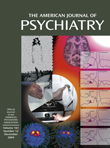To the Editor: Susie Frost, M.Sc., et al.
(1) have reported that the number of articles on eating disorders published in the top psychiatric, psychological, and medical journals between 1996 and 2001 was consistently lower than that of articles published about panic disorder and agoraphobia in the same journals. The authors acknowledged that they were unable to demonstrate the existence of a publication bias against eating disorders but, nevertheless, suggested that negative attitudes (including sexist and clinical prejudices) from editors and reviewers (although many of them are women and/or experts on eating disorders) toward this group of disorders might explain their observations.
In their Discussion section, the authors preliminarily dismissed the possibility that the lower rate of publication might result from a poorer quality of the eating disorder articles. A recent study
(2), however, found a positive association between the methodological quality of clinical research articles and several journal quality indicators, such as the impact factor. We decided, therefore, to compare the quality of the studies on panic disorder and agoraphobia and on eating disorders, using the number of published randomized controlled trials, the gold standard for scientific evidence, as a surrogate for the excellence of the scientific production on the subject.
Our search was restricted to MEDLINE since we found that, except for one, all 534 articles identified by the authors in their study could be located through MEDLINE alone. We used the search terms delineated by Ms. Frost et al.
(1) to determine total publication rates for panic disorder/agoraphobia and for eating disorders. The “randomized controlled trials” option of the “type of publication” search limit of MEDLINE was employed to track down the randomized controlled trials. We discovered that between 1996 and 2001, although the total figures for publications on eating disorders and on panic disorder/agoraphobia were roughly equivalent (N=2,361 and N=2,128, respectively), panic disorder/agoraphobia far outnumbered eating disorders in terms of published randomized controlled trials (N=209 versus N=90, respectively).
A cross-tabulation (panic disorder and agoraphobia versus eating disorders; randomized controlled trials versus other types of publications) showed that panic disorder/agoraphobia publications exhibited a significantly higher proportion of randomized controlled trials than eating disorders publications (χ2=64.05, df=1, p<0.001, with Yate’s correction). These high-quality studies are presumably more likely to get accepted in the top journals. In fact, we found that 51 randomized controlled trials on panic disorder and agoraphobia were published in the top journals between 1996 and 2001 compared to only 19 randomized controlled trials on eating disorders. It is also conceivable that the data generated by these randomized controlled trials will be employed in secondary analyses, thus resulting in additional high-quality publications.
In summary, we agree with the conclusion of Ms. Frost and co-workers that articles about eating disorders may have a lower chance of getting published in the top journals. However, our findings suggest that the possibility of a higher quality of the publications on panic disorder/agoraphobia may account at least for part of this trend cannot be dismissed at this point.

